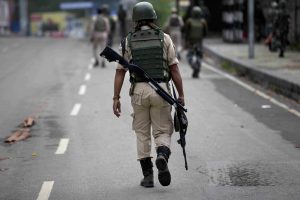Indian police officers in Kashmir recently arrested one of their own and the circumstances of Davinder Singh’s arrest have raised questions in the country over the professionalism of the security services. Singh was caught ferrying two wanted terrorists from the Hizbul Mujahideen militant outfit out of the Kashmir valley, with intelligence services alleging that they intended to escape to Pakistan. Reports suggest that Singh was being paid 1.2 million rupees, or about $17,000, for his services.
Despite being a highly decorated cop who had won accolades for anti-militancy operations, Singh has had an intriguingly checkered past: In the early 1990s, just two years into service, Singh and a fellow officer were caught up a drug smuggling scandal. In 2003, Singh was moved out of his posting in the anti-militancy wing of the police, following grave extortion charges. Then, in 2007, he was suspended on charges of extorting a prominent businessman.
This may just be a case of a corrupt police officer colluding with criminals and indulging in extortion to make a quick buck – a potential “conflict entrepreneur,” as veteran journalist Shekhar Gupta called Singh in his recent analysis.
But in recent days, stories from Singh’s past have brought out skeletons that few had previously imagined. One of the more sensational reports suggest that he was involved in some capacity in the 2001 terrorist attack on the Indian parliament. In 2004, Afzal Guru – the man convicted and later hanged for his participation in those attacks – wrote a letter to his lawyer, alleging that Singh had introduced him to one of the men who later attacked Parliament. Guru claimed that Singh had forced him to arrange transport and accommodation for the attacker. Singh’s role was not, however, further investigated by authorities.
Stories such as these have raised eyebrows among many who have wondered if Singh’s questionable actions were carried out alone or with the complicity of other officers. But whatever the truth of this developing story, the arrest of a decorated cop for corruption, extortion and misdemeanour calls for a long overdue review of India’s security apparatus.
In the aftermath of repeated cross-border terrorist incidents, political and public discourse in India has papered over some very serious lapses on the part of Indian security forces – all lost amidst nationalist rhetoric against Pakistan from New Delhi.
In 2016, for instance, a heavily armed group attacked an Indian air force base in the town of Pathankot in Punjab. In the aftermath of the attack, spotlight quickly shifted to India’s relations with Pakistan, following aggressive political rhetoric.
But reports on events surrounding the attack had raised several questions over India’s security forces: A day before the incident, three people – including an Indian police officer Salvinder Singh and his cook Madan Gopal – had been abducted by the terrorists. In the aftermath of the attack, Gopal alleged that he had shared vital leads with the police regarding the terrorists, which he said were ignored. Salvinder Singh, on his part, had been known to have a chequered past himself, including allegations of sexual harassment.
In 2019, terrorism struck Indian security forces again – this time killing a convoy of 40 officers from the Central Reserve Police Force (CRPF). It was the deadliest attack on Indian security personnel in Kashmir since 1989. Tensions between India and Pakistan climbed once again, culminating in India’s airborne attack on Balakot in Pakistan.
Yet, once again, the political rhetoric against Pakistan pulled the spotlight away from security lapses in India. Soon after the deadly attack, Jammu and Kashmir Governor Satya Pal Malik admitted that security forces had failed to act on intelligence inputs. “There was no intelligence failure because we had received inputs,” the Governor had said, “But there was surely some kind of negligence.”
In the context of rising militancy in Kashmir since 2015, Singh’s arrest poses a stern test for India’s security forces – and for the Modi government in New Delhi. Repeated instances of corruption and misdemeanors by a well-placed, highly decorated, non-Muslim police officer in India’s most heavily militarized and surveilled state is a cause for concern. In the context of past security lapses, it also increases the urgency and need for an honest and thorough review of India’s security apparatus in and around Kashmir. Threats from across the border in Pakistan should no longer distract the Modi government from challenges on the Indian side.

































